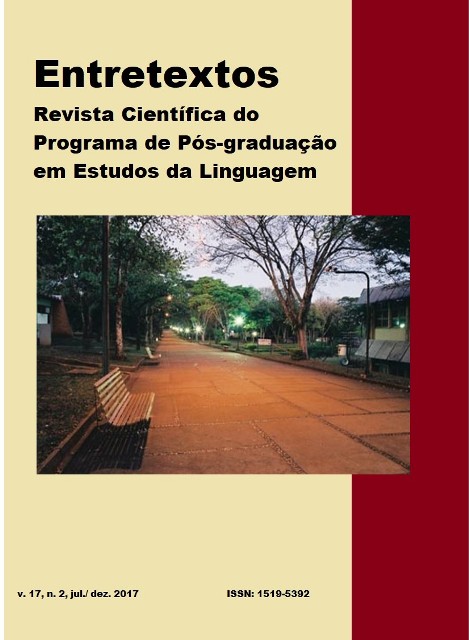The "dutch" and the "brazilians" from Arapoti/PR: the cultural (re)negotiation in the food
DOI:
https://doi.org/10.5433/1519-5392.2017v17n2p149Keywords:
, Cultural (re)negotiation, Memory, Dutch immigrantsAbstract
A group of families from Holland after a long trip by ship adn bus, landed in Arapoti/Pr on 09 June. Since the founding of the Dutch Colony of Arapoti [of wich the researcher is a part], these families relate in one way or another to brazilians already living in the city. In this sociolinguistically complex contexto, therefore, wich involves intercultural dialogues (GARCIA CANCLINI, 2013; JANZEN, 2005), this work, a cut of a máster's research, seeks understand through oral histories and other languages - language as kaleidoscope (CÉSAR; CAVALCANTI, 2007) - for wich the reminicences of the memories also manifest themselves (JOUTARD, 2008; POLLAK, 1989; PORTELLI, 2000), as do cultural (re)negotiations between these Dutch and Brazilians in the food. In order to do so, affiliated with inter/trans aplied linguistics, the work is based on the notion of inter-place (BHAHBA, 2013), with the flexibilization of the imagined community concept (ANDERSON, 2008; HOBSBAWM, 1990) to think how these subjects mobilize the social imaginary in their discursive practices related to the food. Methodologically, the study was guided by a qualitative-interpretative ethnographic perspective. The results suggest that even in the face of a discussion engaged in subverting the traditional concept of culture, with regard to the processes of cultural hybridization, in food and its different languages, classifications (WOODWARD, 2009) continue to be based on binaries, although the processes of cultural hybridization, which are also constituted by cultural disagreements, are evident in the eating habits of these local subjects.
Downloads
References
BHABHA, Homi. O local da cultura. Belo Horizonte: Ed. da UFMG, 2013.
BOSI, Ecléa. Memória e sociedade: lembranças de velhos. 3. ed. São Paulo: Companhia das Letras, 1994.
BOSI, Ecléa. O tempo vivo da memória: ensaios de psicologia social. São Paulo: Ateliê, 2003.
CAVALCANTI, M. C. Educação linguística na formação de professores de línguas: intercompreensão e práticas translíngues. In: MOITA LOPES, Luiz Paulo. (Org.). Linguística aplicada na modernidade recente - Festschrift para Antonieta Celani. São Paulo: Parábola, 2013. v. 1, p. 211-226.
CÉSAR, América; CAVALCANTI, Marilda do Couto. Do singular ao multifacetado: o conceito de língua como caleidoscópio. In: CAVALCANTI, Marilda do Couto; BORTONI-RICARDO, Stella Maris (Org.). Transculturalidade, linguagem e educação. Campinas: Mercado de Letras, 2007. p. 45-66.
CUCHE, Dennys. A noção de cultura nas ciências sociais. Tradução de Viviane Ribeiro. 2. Ed. Bauru: EDUSC, 2002.
EAGLETON, Terry. A ideia de cultura. São Paulo: UNESP, 2011.
GARCÍA CANCLINI, Nestor. Culturas híbridas: estratégias para entrar e sair da modernidade. Tradução de Ana Regina Lessa e Heloísa Pezza Cintrão. 3. ed. São Paulo: EDUSP, 2013.
HALL, Stuart. A identidade cultural na pós-modernidade. Tradução de Tomaz Tadeu da Silva e Guaracira Lopes Louro. 11. ed. Rio de Janeiro: DP & A, 2011.
HALL, Stuart. Quem precisa da identidade? In: SILVA, Tomaz Tadeu (Org.). Identidade e diferença: a perspectiva dos estudos culturais. São Paulo: Vozes, 2009. p. 103 -133.
HOBSBAWM, Eric. Nações e nacionalismos desde 1780: programa, mito e realidade. Rio de Janeiro: Paz e Terra, 1990.
HOBSBAWM, Eric; RANGER, Terence (Org.). A invenção das tradições. Rio de Janeiro: Paz e Terra, 1984. p. 9-23.
JANZEN, Henrique Evaldo. O Ateneu e Jakob von Gunten: um diálogo intercultural possível. 2005. Tese (Doutorado em Língua e Literatura Alemã) - Universidade de São Paulo.
KRISTEVA, Julia. Estrangeiros para nós mesmos. Tradução de Maria Carlota C. Gomes. Rio de Janeiro: Rocco, 1994.
LAVERDI, Robson et al. História oral, desigualdades e diferenças. Recife: Ed. da UFPE; Florianópolis: EDUFSC, 2012.
LESSER, Jeffrey. A negociação da identidade nacional: imigrantes, minorias e a luta pela etnicidade no Brasil. Tradução de Patrícia de Queiroz C. Zimbres. São Paulo: EDUNESP, 2001.
MOITA LOPES, Luiz Paulo (Org.). O português no século XXI: cenário geopolítico e sociolinguístico. São Paulo: Parábola, 2013.
POLLAK, Michael. Memória, esquecimento, silêncio. Estudos Históricos, Rio de Janeiro, v. 2, n. 3, p. 3-15, 1989.
PORTELLI, Alessandro. Memória e diálogo: desafios da história oral para a ideologia do século XXI. In: FERREIRA, Marieta de Moraes; FERNANDES, Tânia Maria Dias; ALBERTI, Verena. (Org.). História oral: desafios para o século XXI. Rio de Janeiro: Fiocruz, 2000. p. 67-71.
SILVA, Tomaz Tadeu. A produção social da identidade e da diferença. In: SILVA, Tomaz Tadeu (Org.). Identidade e diferença: a perspectiva dos estudos culturais. Petrópolis: Vozes, 2009.
WOODWARD, Katherine. Identidade e diferença: uma introdução teórica e conceitual. In: SILVA, Tomaz Tadeu (Org.). Identidade e diferença: a perspectiva dos estudos culturais. Petrópolis: Vozes, 2009.
Downloads
Published
How to Cite
Issue
Section
License
Copyright (c) 2017 Entretextos

This work is licensed under a Creative Commons Attribution 4.0 International License.
Entretextos adota a Licença Creative Commons Attribution 4.0 International, portanto, os direitos autorais relativos aos artigos publicados são do/s autor/es.
Sob essa licença é possível: Compartilhar - copiar e redistribuir o material em qualquer suporte ou formato. Adaptar - remixar, transformar, e criar a partir do material, atribuindo o devido crédito e prover um link para a licença e indicar se mudanças foram feitas.























